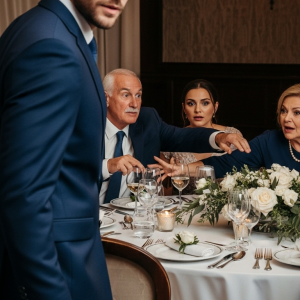The courtroom air was thin and cold, each breath a struggle. Judge Rivera leaned forward, his expression a mask of veiled skepticism. His gaze shifted from me to my ex-husband, Caleb, and back again.
“Why would a child choose her?” the judge asked, his voice echoing with finality. It wasn’t just a question; it felt like a verdict.
A low, confident chuckle rumbled from Caleb’s chest, a sound of pure arrogance that filled the sterile room. Dressed in an Italian suit that was worth more than my car, he looked every bit the powerful tech mogul he had become. His lawyer, Ms. Winters, a woman as sharp and cold as her name suggested, gave a curt, approving nod. In their eyes, the case was already won. They had the money, the influence, the narrative. I had nothing but the frantic beat of my own heart.
And that’s when it happened.
My seven-year-old daughter, Phoenix, who usually hid behind my legs in public, let go of my hand. She stood up, her small frame surprisingly steady.
“Your Honor,” she said, her voice clear and strong, cutting through the suffocating silence. “I have the video of what he does when he thinks I’m asleep.”
The world stopped. The judge, who had been reaching for his pen, froze. His hand hovered in mid-air. Caleb’s smug smirk vanished, replaced by a flash of disbelief, then panic. Ms. Winters’s perfectly composed face fractured with confusion.
In that moment, with a pink tablet clutched in her small hands, my daughter changed everything.
My name is Jade Roberts. Six months ago, my biggest worry was balancing my night shifts as a nurse with Phoenix’s school schedule. For five years, since Caleb had walked out on us for a “new life,” it had just been the two of us. He was an occasional birthday card, a sporadic child support payment that never quite arrived on time. We built our world without him, a world of weekend trips to the children’s museum and Sunday morning pancakes shaped like animals.
“Mommy, the elephant’s trunk looks like a noodle!” Phoenix would giggle, her smile made even more precious by her missing front teeth. She was my everything.
Then Caleb’s tech company went public. Suddenly, he was a millionaire who wanted to be a father. It started with dinners, then weekend visits. Soon, the custody papers arrived, a brutal assault of legal jargon claiming I was “negligent” and “emotionally unstable.”
My neighbor, Elena, was livid. “This is absurd!” she said, her hands trembling more than mine as she read the documents. “He can’t just waltz back in here after all this time!”
But he could, and he did. With his new wife, Diane, standing adoringly by his side, Caleb painted a picture of himself as the concerned father, desperate to rescue his daughter from a life of mediocrity. A court-appointed evaluator visited my modest two-bedroom apartment, her eyes lingering on a faint water stain on the ceiling and the stack of nursing textbooks beside my bed. She noted the “limited space” but failed to mention the hand-painted solar system I’d created on Phoenix’s ceiling or the cozy reading nook we’d built together.
Caleb’s narrative was powerful because it was built on a foundation of money. He could offer a mansion in a gated community, private schools, a life I couldn’t possibly compete with. What the court couldn’t see was the change in Phoenix.
She started coming home from his weekend visits withdrawn and quiet. The light in her eyes would be dimmed. She started having nightmares, waking up crying for me. One evening, I found her hiding her favorite stuffed rabbit in the laundry hamper.
“So Mr. Bear is safe until I get back,” she whispered, not meeting my eyes.
The final straw was the small, faint bruise on her wrist.
“Sweetie, what happened to your arm?” I asked, my voice shaking as I knelt beside her.
She pulled her sleeve down quickly. “I fell,” she mumbled, but the lie was plain on her face.
That night, after her bath, I was brushing her hair when she looked at me in the mirror, her eyes wide with a heavy secret. “Mommy,” she asked, her voice barely a whisper, “is it bad to take videos of people without asking?”
My blood ran cold. “That depends, sweetheart. Why do you ask?”
Her lower lip trembled. “I did something that might make Daddy really mad.”
She reached under her pillow and pulled out the tablet Caleb had given her for “educational games.” With careful fingers, she opened a hidden folder.
The videos were dark, shaky, clearly filmed by a child pretending to be asleep. But the audio was chillingly clear. It was Caleb and Diane, their voices low and menacing.
“You need to tell the judge your mother leaves you alone,” Caleb’s voice hissed. “Tell him you’re scared when she works nights.”
“But that’s not true,” Phoenix’s tiny voice replied. A sharp thud, like a fist hitting a table, made me jump.
“I don’t care what’s true!” Caleb snarled. “Do you want to live in that dump forever?”
Then Diane’s voice, smooth as venom. “Your mother is a nobody. Just coach her better, Caleb. She’s seven, for God’s sake. She’ll say whatever we tell her to.”
I watched three videos, each one a deeper descent into their cruel manipulation. The last one was the worst.
“Phoenix is our ticket to destroying Jade,” Caleb said. “Once we get custody, we can move to the San Francisco office and leave all this behind.”
“What about Phoenix?” Diane asked casually while applying face cream.
“There are excellent boarding schools in Switzerland,” Caleb replied. “Problem solved.”
When the videos ended, I pulled my daughter into my arms, her small body trembling against mine. “Oh, sweetheart,” I sobbed. “You are so, so brave.”
My lawyer, Rachel Okafor, was a force of nature. She was young, but her eyes held a fierce intelligence that calmed my frayed nerves.
“In most states, recordings made by a child in their own home are admissible, especially when documenting potential emotional harm,” she explained after watching the videos, her expression grim. “But we have to be careful. Caleb’s lawyer will argue you manipulated Phoenix.”
“I didn’t know these existed until last night,” I insisted.
“I believe you,” Rachel said. “And I think Judge Rivera will too. But Phoenix has to be the one to present this. It has to come from her.”
Now, in the tense courtroom, as Judge Rivera stared down from the bench, his brow furrowed, I saw Caleb’s composure finally crack.
“What video?” he hissed across the aisle, his face flushed red. “What did you do?”
Phoenix didn’t flinch. She just stood taller.
After a tense conference with the attorneys, Judge Rivera called for a thirty-minute recess while he reviewed the evidence in his chambers. When we returned, the atmosphere in the room had shifted. The judge’s neutral expression had hardened into one of undisguised contempt. He looked directly at Caleb.
“Mr. Sullivan,” he began, his voice dangerously low, “this court finds your behavior, as exhibited in these recordings, to be profoundly disturbing. The evidence clearly shows a pattern of manipulation and a complete disregard for your daughter’s well-being.”
“Your Honor, those recordings were obtained illegally! She was coached!” Caleb sputtered, rising to his feet.
“Sit down, Mr. Sullivan!” Judge Rivera commanded. “The authenticity of these recordings is not in question. Your daughter’s unscripted responses make it abundantly clear she was not coached. In fact, her bravery is astonishing.”
He then turned his gaze to Phoenix, and for the first time, his expression softened. “Young lady,” he said gently, “did anyone tell you to make these videos?”
Phoenix shook her head. “No, sir. I just wanted someone to believe me.”
The judge nodded slowly, a deep sadness in his eyes. He picked up his gavel.
“This court awards full legal and physical custody to Ms. Jade Roberts. Mr. Sullivan will have supervised visitation only, pending the completion of court-mandated anger management and parenting classes. This court is adjourned.”
The gavel fell with a final, echoing crack. It was over.
Caleb stood frozen, his face a mask of rage and disbelief. For a moment, I thought he would explode, but then he simply deflated, a powerful man suddenly rendered powerless by the quiet courage of his own child.
As we left the courthouse, the rain had stopped. Phoenix slipped her small hand into mine. “Can we have pancakes for dinner, Mommy?” she asked.
I laughed, a sound lighter and freer than any I had made in months. “Sweetheart,” I said, squeezing her hand, “we can have pancakes for breakfast, lunch, and dinner.”
We were going home. And for the first time in a very long time, we were truly safe.
The courtroom air was thin and cold, each breath a struggle. Judge Rivera leaned forward, his expression a mask of veiled skepticism. His gaze shifted from me to my ex-husband, Caleb, and back again.
“Why would a child choose her?” the judge asked, his voice echoing with finality. It wasn’t just a question; it felt like a verdict.
A low, confident chuckle rumbled from Caleb’s chest, a sound of pure arrogance that filled the sterile room. Dressed in an Italian suit that was worth more than my car, he looked every bit the powerful tech mogul he had become. His lawyer, Ms. Winters, a woman as sharp and cold as her name suggested, gave a curt, approving nod. In their eyes, the case was already won. They had the money, the influence, the narrative. I had nothing but the frantic beat of my own heart.
And that’s when it happened.
My seven-year-old daughter, Phoenix, who usually hid behind my legs in public, let go of my hand. She stood up, her small frame surprisingly steady.
“Your Honor,” she said, her voice clear and strong, cutting through the suffocating silence. “I have the video of what he does when he thinks I’m asleep.”
The world stopped. The judge, who had been reaching for his pen, froze. His hand hovered in mid-air. Caleb’s smug smirk vanished, replaced by a flash of disbelief, then panic. Ms. Winters’s perfectly composed face fractured with confusion.
In that moment, with a pink tablet clutched in her small hands, my daughter changed everything.
My name is Jade Roberts. Six months ago, my biggest worry was balancing my night shifts as a nurse with Phoenix’s school schedule. For five years, since Caleb had walked out on us for a “new life,” it had just been the two of us. He was an occasional birthday card, a sporadic child support payment that never quite arrived on time. We built our world without him, a world of weekend trips to the children’s museum and Sunday morning pancakes shaped like animals.
“Mommy, the elephant’s trunk looks like a noodle!” Phoenix would giggle, her smile made even more precious by her missing front teeth. She was my everything.
Then Caleb’s tech company went public. Suddenly, he was a millionaire who wanted to be a father. It started with dinners, then weekend visits. Soon, the custody papers arrived, a brutal assault of legal jargon claiming I was “negligent” and “emotionally unstable.”
My neighbor, Elena, was livid. “This is absurd!” she said, her hands trembling more than mine as she read the documents. “He can’t just waltz back in here after all this time!”
But he could, and he did. With his new wife, Diane, standing adoringly by his side, Caleb painted a picture of himself as the concerned father, desperate to rescue his daughter from a life of mediocrity. A court-appointed evaluator visited my modest two-bedroom apartment, her eyes lingering on a faint water stain on the ceiling and the stack of nursing textbooks beside my bed. She noted the “limited space” but failed to mention the hand-painted solar system I’d created on Phoenix’s ceiling or the cozy reading nook we’d built together.
Caleb’s narrative was powerful because it was built on a foundation of money. He could offer a mansion in a gated community, private schools, a life I couldn’t possibly compete with. What the court couldn’t see was the change in Phoenix.
She started coming home from his weekend visits withdrawn and quiet. The light in her eyes would be dimmed. She started having nightmares, waking up crying for me. One evening, I found her hiding her favorite stuffed rabbit in the laundry hamper.
“So Mr. Bear is safe until I get back,” she whispered, not meeting my eyes.
The final straw was the small, faint bruise on her wrist.
“Sweetie, what happened to your arm?” I asked, my voice shaking as I knelt beside her.
She pulled her sleeve down quickly. “I fell,” she mumbled, but the lie was plain on her face.
That night, after her bath, I was brushing her hair when she looked at me in the mirror, her eyes wide with a heavy secret. “Mommy,” she asked, her voice barely a whisper, “is it bad to take videos of people without asking?”
My blood ran cold. “That depends, sweetheart. Why do you ask?”
Her lower lip trembled. “I did something that might make Daddy really mad.”
She reached under her pillow and pulled out the tablet Caleb had given her for “educational games.” With careful fingers, she opened a hidden folder.
The videos were dark, shaky, clearly filmed by a child pretending to be asleep. But the audio was chillingly clear. It was Caleb and Diane, their voices low and menacing.
“You need to tell the judge your mother leaves you alone,” Caleb’s voice hissed. “Tell him you’re scared when she works nights.”
“But that’s not true,” Phoenix’s tiny voice replied. A sharp thud, like a fist hitting a table, made me jump.
“I don’t care what’s true!” Caleb snarled. “Do you want to live in that dump forever?”
Then Diane’s voice, smooth as venom. “Your mother is a nobody. Just coach her better, Caleb. She’s seven, for God’s sake. She’ll say whatever we tell her to.”
I watched three videos, each one a deeper descent into their cruel manipulation. The last one was the worst.
“Phoenix is our ticket to destroying Jade,” Caleb said. “Once we get custody, we can move to the San Francisco office and leave all this behind.”
“What about Phoenix?” Diane asked casually while applying face cream.
“There are excellent boarding schools in Switzerland,” Caleb replied. “Problem solved.”
When the videos ended, I pulled my daughter into my arms, her small body trembling against mine. “Oh, sweetheart,” I sobbed. “You are so, so brave.”
My lawyer, Rachel Okafor, was a force of nature. She was young, but her eyes held a fierce intelligence that calmed my frayed nerves.
“In most states, recordings made by a child in their own home are admissible, especially when documenting potential emotional harm,” she explained after watching the videos, her expression grim. “But we have to be careful. Caleb’s lawyer will argue you manipulated Phoenix.”
“I didn’t know these existed until last night,” I insisted.
“I believe you,” Rachel said. “And I think Judge Rivera will too. But Phoenix has to be the one to present this. It has to come from her.”
Now, in the tense courtroom, as Judge Rivera stared down from the bench, his brow furrowed, I saw Caleb’s composure finally crack.
“What video?” he hissed across the aisle, his face flushed red. “What did you do?”
Phoenix didn’t flinch. She just stood taller.
After a tense conference with the attorneys, Judge Rivera called for a thirty-minute recess while he reviewed the evidence in his chambers. When we returned, the atmosphere in the room had shifted. The judge’s neutral expression had hardened into one of undisguised contempt. He looked directly at Caleb.
“Mr. Sullivan,” he began, his voice dangerously low, “this court finds your behavior, as exhibited in these recordings, to be profoundly disturbing. The evidence clearly shows a pattern of manipulation and a complete disregard for your daughter’s well-being.”
“Your Honor, those recordings were obtained illegally! She was coached!” Caleb sputtered, rising to his feet.
“Sit down, Mr. Sullivan!” Judge Rivera commanded. “The authenticity of these recordings is not in question. Your daughter’s unscripted responses make it abundantly clear she was not coached. In fact, her bravery is astonishing.”
He then turned his gaze to Phoenix, and for the first time, his expression softened. “Young lady,” he said gently, “did anyone tell you to make these videos?”
Phoenix shook her head. “No, sir. I just wanted someone to believe me.”
The judge nodded slowly, a deep sadness in his eyes. He picked up his gavel.
“This court awards full legal and physical custody to Ms. Jade Roberts. Mr. Sullivan will have supervised visitation only, pending the completion of court-mandated anger management and parenting classes. This court is adjourned.”
The gavel fell with a final, echoing crack. It was over.
Caleb stood frozen, his face a mask of rage and disbelief. For a moment, I thought he would explode, but then he simply deflated, a powerful man suddenly rendered powerless by the quiet courage of his own child.
As we left the courthouse, the rain had stopped. Phoenix slipped her small hand into mine. “Can we have pancakes for dinner, Mommy?” she asked.
I laughed, a sound lighter and freer than any I had made in months. “Sweetheart,” I said, squeezing her hand, “we can have pancakes for breakfast, lunch, and dinner.”
We were going home. And for the first time in a very long time, we were truly safe.




